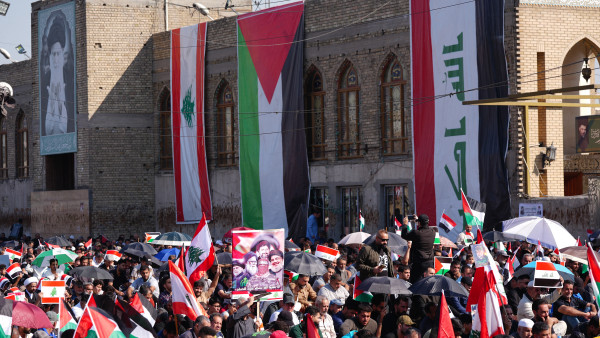Iraqi analysts have voiced deep concern over escalating tensions in the region. [Getty]
Iraq has vehemently rejected a complaint lodged by Israel with the United Nations Security Council, accusing Tel Aviv of using the move as a pretext for launching attacks on Iraqi soil.
During an emergency meeting of the National Security Council on Tuesday night, Prime Minister Mohammed Shia Al-Sudani and senior officials characterised Israel’s actions as part of a deliberate effort to escalate regional conflict.
“This complaint is merely a pretext for aggression,” said Major General Yahya Rasool, spokesperson for the commander-in-chief. He described Israel’s allegations as unfounded and emphasised that Iraq alone holds the authority to make decisions on matters of war and peace. Rasool added that Iraq remains committed to preventing its territory from being used as a platform for attacks on other nations. Recent efforts, he said, included dismantling weapons caches and prosecuting individuals involved in activities threatening Iraq’s security.
Israeli Foreign Minister Gideon Sa’ar on Monday urged the United Nations Security Council to take decisive action against what he described as attacks on Israel by Iran-backed paramilitary groups operating from Iraqi territory.
“In a letter sent this evening to the president of the UN Security Council, I called for immediate intervention regarding the activities of pro-Iranian militias in Iraq, whose territory is being used to launch attacks against Israel,” Sa’ar said in a post on X, sharing an image of the letter.
Sa’ar claimed Israel’s ‘right to self-defence’ under the UN Charter and placed responsibility on Iraq, arguing that “under international law, Iraq is obligated to prevent the use of its territory as a base for attacks against other nations.”
Escalating threats and diplomatic moves
The Iraqi government has announced a series of measures to counter what it sees as escalating threats. The Foreign Ministry has been directed to take the issue to international and regional forums, including the UN Security Council. Iraq is also seeking to rally the Arab League to adopt a unified stance against Israel’s alleged provocations, urging member states to act collectively in defence of regional stability.
Baghdad has urged the UN to review previously submitted complaints against Israel, impose sanctions, and ensure accountability for violations of international law. Despite these efforts, experts suggest Iraq’s capacity to act independently may be limited.
Ihsan al-Shammari, a professor of political science and head of the Iraqi Political Thinking Center, described the situation as deeply concerning. “The Israeli threats appear to be both realistic and serious, especially considering that the United States has lost trust in Mohammed Shia’ Al-Sudani as Prime Minister,” Al-Shammari told The New Arab. “This is because he had previously given promises and guarantees of his ability to neutralize these armed factions and prevent them from carrying out any actions that could use Iraqi territory to target Tel Aviv or other areas in Israel.”
Al-Shammari highlighted Netanyahu’s recent statements at the UN General Assembly, suggesting that Israel’s Foreign Minister’s letter to the UN Security Council signals an intent to strike Iran-aligned armed factions in Iraq. “These factions remain committed to the ‘unity of fronts’ principle and do not heed Al-Sudani, given that these factions were the ones who brought Al-Sudani to power and continue to support him as part of the Shia Coordination Framework,” he said.
“The strikes appear inevitable, to undermine the influence of these armed factions. Netanyahu seems to be operating under the principle of six fronts: Gaza, southern Lebanon, Syria, Yemen, Iraq, and Iran,” he added.
Targeting armed factions and beyond
Al-Shammari outlined a grim scenario for Iraq. He suggested Israel’s strikes will target three levels: armed faction leaders, their infrastructure—such as weapons storage and operational headquarters—and potentially civilian institutions. “Israel has held Al-Sudani and the Iraqi government responsible for their inability to prevent these factions from carrying out these attacks,” he said.
Ghani Ghazban, an Iraqi political and security analyst, echoed this assessment. “The threats of the Zionist entity against Iraq will be carried out,” he told TNA. “Armed factions, whether individuals or others, will be targeted, and the Iraqi government will not be able to do anything about it. Tracking anyone who uses weapons outside the state’s authority and arresting them—these are merely public statements, and they are incapable of carrying out such actions.”
Ghazban warned that strikes would likely target the headquarters of the Popular Mobilisation Forces and Iran-aligned groups, as well as specific individuals previously mentioned by Israel.
In light of these threats, Iraq is ramping up its security measures. Al-Sudani has ordered increased troop deployments along Iraq’s western borders and the strengthening of air defence systems to protect critical infrastructure. Intelligence agencies have been tasked with monitoring and reporting any hostile activities.
The National Security Council warned that Israeli actions risk destabilising the region and undermining international peace efforts. “Iraq remains committed to the principles of international law and the UN Charter,” the council’s statement read. “We call on all parties to reject provocations and work towards peaceful resolutions.”
Iran-backed militias in Iraq have escalated attacks since Israel’s war on Gaza began on 7 October 2023, targeting Israel with drones and striking US bases in Iraq.
In early October 2024, the Islamic Resistance in Iraq, a coalition of Iranian-backed Iraqi militias, claimed responsibility for a drone strike on an Israeli military base in the Golan Heights, killing two Israeli soldiers and wounding 24 others.
In late October 2024, Iraq condemned Israel’s use of Iraqi airspace to launch attacks on neighbouring Iran. A protest letter addressed to UN Secretary-General António Guterres and the UN Security Council from Baghdad denounced the violation of its sovereignty and called for international action against Israel‘s actions.
Iraq‘s leadership reiterated its solidarity with nations facing aggression, pledging humanitarian, political, and legal support. However, experts suggest that Baghdad’s ability to navigate these challenges independently is constrained by its reliance on Iran-aligned factions and a volatile regional landscape.

